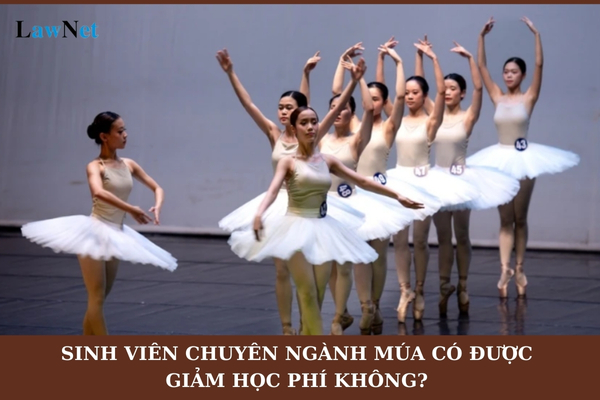Are students pursuing dance in Vietnam eligible for tuition reduction?
Are students pursuing dance in Vietnam eligible for tuition reduction?
Under Clause 1, Article 16 of Decree 81/2021/ND-CP, the regulation on those eligible for tuition reduction in Vietnam is as follows:
Eligibility for tuition reduction and tuition financing
1. Eligibility for a tuition reduction of 70% includes:
a) Students pursuing traditional arts and specific majors in public, private vocational education institutions and higher education institutions providing cultural - artistic training;
b) Students pursuing traditional art forms or taxing, toxic, or hazardous occupations in case of vocational education as per lists of taxing, toxic, or hazardous occupations regulated by Ministry of Labor – War Invalids and Social Affairs;
c) Kindergarten children and students who are ethnic minorities (other than very minor ethnic minorities) in hamlets with particular difficulties, communes in category III areas, ethnic regions and mountainous regions, communes with difficulties in coastal regions and islands according to regulations of competent authority.
...
According to the above regulations, students pursuing dance in Vietnam are eligible for a 70% tuition reduction.

Are students pursuing dance in Vietnam eligible for tuition reduction? (Image from the Internet)
What is the top tuition limit for students pursuing dance in the 2024-2025 academic year in Vietnam?
Under Clause 2, Article 11 of Decree 81/2021/ND-CP, as amended by Point b, Clause 3, Article 1 of Decree 97/2023/ND-CP, the top tuition limit for students pursuing dance in the 2024-2025 academic year in Vietnam is as follows:
(1) The top tuition limit for public higher education institutions that have not guaranteed recurrent expenditures is 1,350 thousand VND/student/month.
(2) The top tuition limit for majors in higher education level in public higher education institutions that have guaranteed recurrent expenditure is determined up to a maximum of twice the tuition ceiling for public higher education institutions that have not ensured their regular expenditures, meaning a maximum of 2,700 thousand VND/student/month.
(3) The top tuition limit for public higher education institutions that have guaranteed recurrent expenditure and investment expenditure entirely is determined up to a maximum of 2.5 times the tuition ceiling for public higher education institutions that have not ensured their regular expenditures, meaning a maximum of 3,375 thousand VND/student/month.
Furthermore, for training programs of public higher education institutions that satisfy quality accreditation standards of the Ministry of Education and Training or quality accreditation standards of foreign countries or equivalent, higher education institutions are allowed to determine tuition of the training programs on the basis of economic and technical norms issued by the higher education institutions while publicizing and presenting to learners and the general public.
What are the principles for determining tuition for public higher education institutions in Vietnam?
According to the regulations in Clause 3, Article 8 of Decree 81/2021/ND-CP, the principles for determining tuition for public higher education institutions in Vietnam are as follows:
- Public higher education institutions that have guaranteed recurrent expenditure partially and public higher education institutions that have recurrent expenditure guaranteed by the government (hereinafter referred to as “public higher education institutions that have not guaranteed recurrent expenditure entirely”) shall determine tuition without exceeding the top limit under Point a Clause 1 and Point a Clause 2 Article 11 of Decree 81/2021/ND-CP;
- Public higher education institutions that have guaranteed recurrent expenditure and investment expenditure entirely and public higher education institutions that have guaranteed recurrent expenditure shall determine tuition for each major with variables compared to the top limit applicable to public higher education institutions that have not guaranteed recurrent expenditure entirely under Clause 2 Article 11 of Decree 81/2021/ND-CP;
- For training programs of public higher education institutions that satisfy quality control standards of the Ministry of Education and Training or quality control standards of foreign countries or equivalent, higher education institutions are allowed to determine tuition of the training programs on the basis of economic and technical norms issued by the higher education institutions while publicizing and presenting to learners and the general public.

